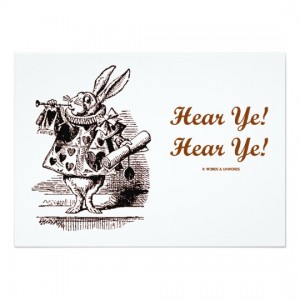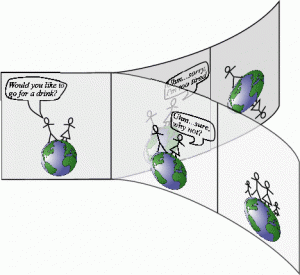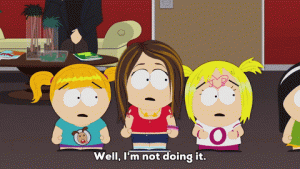
Best of all worlds. MOM, Genesis 2.0, and Resurrections are topping bestseller lists worldwide for the third month in a row. Mobs are rioting in the streets of major cities everywhere, demanding the author cough up Kill Cade, the fourth novel in the MAGIC CIRCLE series. Hollywood agents are climbing in the windows, groupies clamor at the door. Sara won’t talk to me. It’s amazing.
Yeah. And all this is happening in a near-adjacent parallel universe where the internet was never invented. Meanwhile, back in this universe…

Three strikes against Magic Circles. How to keep readers from getting to first base.
- strike one
Seventy percent of the adult US population reportedly don’t understand the prevailing scientific account of evolution. Either that, or—for reasons related to political ideology, religious beliefs and inadequate education—they describe it as outright malarkey.
Missing the point. The Magic Circles novels unfold against a background of evolutionary developments in the second half of the 21st century. For most readers, the dramatic conflicts and dark humor are enough to carry the story. But those who are blind to the evolutionary framework behind the narrative will miss much, including the ultimate point of the series as a whole.
Missed opportunities. In an ideal world, Magic Circles readers would gradually adopt the evolutionary perspective, at the same time learning to reinterpret experience writ large, in part considering possible novel developments in the not-too-distant future.
Among other things, they’d come to understand the circumstances, late in Resurrections, under which a machine intelligence would turn the entire universe an unpleasant shade of pink.
- strike two
Many people are unable or unwilling to adopt the evolutionary perspective. But an even larger proportion of the reading public—variously described as Cartesian, reductivist, doctrinaire logico-positivist, scientistic and worse—won’t understand key developments in Magic Circles. They’ll find them inscrutable, at best unscientific.
And that’ll be because they’re applying the currently mainstream interpretive framework to human experience. This cognitive lens remains the one favored by most physical and social scientists, at least in the Anglo-American world. But this perspective is wrong-headed.
Missing a chance to help save the world. It is demonstrably wrong, and arguably, a major contribution to much of what ails the world today. (That’s just by way of saying screw you, reductivist critics of Magic Circles.) And this series presents my shot at saving the world.
And it isn’t as though I’m without allies in the scientific and philosophical worlds. Take for example Stuart A. Kauffman, Terrance Deacon, Humberto Maturana and Francisco Varela, each of them highly respected thinkers with a broad range of expertise who seek to uncover the natural laws of complexity and emergent order. Self-organization is a major theme right from the outset in MOM, the first novel in the series, where the dreaded grey-goo scenario is narrowly averted when principles of self-organization and territoriality largely contain a plague of blurs (feral self-replicating nanobots).
- strike three
Most readers who prefer “literary fiction”—myself included—are biased against “science fiction.” For this reason I prefer to describe Magic Circles as “speculative fiction,” never mind this does no good.
Missing an opportunity to explore the space between two stools. At the same time, many genre science-fiction readers have an aversion to “literary” sci-fi, maybe figuring this is a case of putting on airs or perhaps failing to provide a reading experience that’s similar to watching TV. In any case, some might argue Magic Circles falls between those two genres.
conclusions
There you go, then—three strikes against my book series. Does that mean I’ve struck out? Not necessarily.
I hope these posts in themselves encourage some readers to take a chance with Magic Circles. Take a chance? Yes. Those who are prepared to engage with this story—to put aside their various prejudices, to subject familiar interpretive frameworks to critical reflection, and to try wrapping their heads around evolutionary thinking—will discover that, beyond its grand ideas, Magic Circles bubbles with sex and violence and fun unfolding against the most astonishing developments since the emergence of life itself.
Amid the current deluge of new books, not to mention speculative fiction and especially post-apocryphal dystopian fiction, why read Magic Circles? Most who do read this series will find it becomes progressively more interesting as they proceed, more multi-dimensional. Having finished the novels, readers may then go on to interpret the “real world” of everyday experience differently, sometimes in subtle ways not obviously related to Magic Circles.
Am I going to write more novels in this series? Yes, I am. And to hell with all the readers who won’t read them for the reasons I’ve outlined above. Let Don Quixote be my guide in this endeavor. (See Blacksmiths & Blockheads.)
Note. There’s probably another strike against these novels, but talk of a fourth strike would blow the baseball metaphor. Not to mention that, if I haven’t already scared off prospective readers with the foregoing diatribe, then this fourth item is sure to do it:
The Magic Circles novels are long buggers. Unfashionably long to the point some readers will find they don’t leave enough time for social media and YouTube videos. (For more on long novels, visit Inspirational Hobologoist Aphorisms & Epigrams.)
But if you have in fact read this long post to its bitter conclusion, then you may well qualify as a Magic Circles reader.
A parting question. Has the whole thrust of this post really pissed you off? Are you convinced its author is a flipping nitwit? If so, good. Then I hope you get drawn into reading these novels, if for no other reason than to confirm those sentiments. And I wish you such a long life you have time to read them all as I continue to churn this stuff out, tilting at windmills even as I lapse into starving writerhood.

Reality check. And again, back in the home world, here’s Sara.
“You said you had things to do. What’s this stuff?”
“Reverse-psychological promotion. Pretty cool, eh?”
“Ha, ha. I’ve got an idea. Can we move to this adjacent universe of yours where we’re getting rich?”
“Yeah, but there’d be this problem with the groupies.”
“Dream on.”

You could still use the baseball metaphor but use fouls. Fouls may be more appropriate besides there being 4.
I can relate to some of your strikes. I’m not into science fiction and but I found Magic Circles books more intriguing and much more well thought. Look forward to reading the next one.
Thank you, Patrick. I’m staggered–you’ve not only visited my blog site, you’ve actually read MOM & Genesis 2.0. I feel you deserve a reward. I could finish the third novel in the series, but maybe you’d rather I just shouted a drink at some point. 🙂